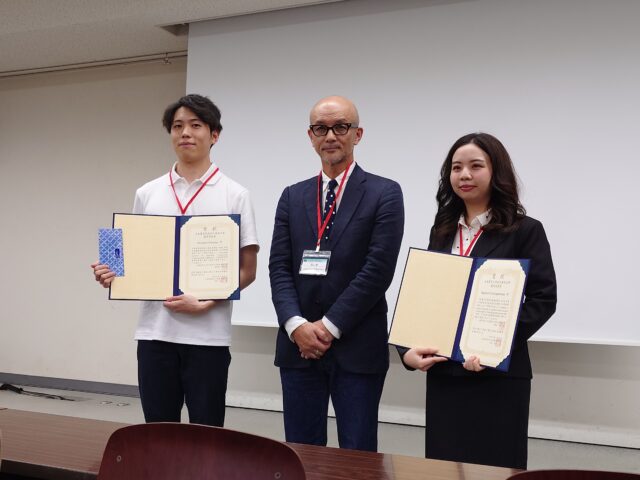Masanori Uchiyama (Laboratory of Biochemistry) and Napaporn Chintagavongse (Laboratory of Applied Food Science) won the Excellent Presentation Award, Hokkaido Branch of the Japan Society for Bioscience, Biotechnology, and Agrochemistry
Masanori Uchiyama (a first-year student of Frontiers in Biosciences, Division of Agriculture, Graduate School of Agriculture) and Napaporn Chintagavongse (a third-year student of Frontiers in Biosciences, Division of Agriculture, Graduate School of Agriculture) won the Excellent Presentation Award at the First Meeting 2024 of JSBBA Hokkaido Branch, which was held at Tokachi Plaza, Obihiro, on July 13, 2024.
Structural analysis of galactose 2-epimerase complexed with D-galactitol
Masanori Uchiyama1, Wataru Saburi1, Shiho Takei2, Toyoyuki Ose2, Haruhide Mori1
1Graduate School of Agriculture, Hokkaido University
2Graduate School of Life Science, Hokkaido University
Sugar epimerases are useful biocatalysts to produce rare sugars from abundant sugars. Uchiyama et al. previously discovered a novel sugar epimerase, galactose 2-epimerase, catalyzing the epimerization of D-galactose to a rare monosaccharide, D-talose. In this study, he and his colleagues analyzed the crystal structure of galactose 2-epimerase in complex with a substrate-like compound, D-galactitol, to understand the mechanism for the substrate specificity of this enzyme. The tryptophan residue on the long loop of galactose 2-epimerase was shown to be situated at the suitable position to interact with D-galactose and D-talose, and this residue was pointed out as a key residue for high specificity to these monosaccharides.
Studies to reduce rancidity in ripened cheese caused by koji adjunct from Aspergillus oryzae AHU 7139
Napaporn Chintagavongse1, Koichi Tamano2, Toru Hayakawa1, Jun-ichi Wakamatsu3, Haruto Kumura1
1Applied Food Science Laboratory, Graduate School of Agriculture, Hokkaido University
2Bioproduction Research Institute, Hokkaido Center, AIST
3Cell and Tissue Biology Laboratory, Graduate School of Agriculture, Hokkaido University
Since food grade Aspergillus sp. possesses highly proteolytic potential, it has been expected to apply flavor enrichment of cheese ripening. However, its lipolytic ability causes flavor defect due to the release of volatile fatty acids from milk lipids. Chintagavongse et al. identified lipase molecules related to this flavor defects among the lipase genes encoded in A. oryzae AHU 7139. Then, they reached to find a culture condition that allowed reduction of lipase production while keeping productivity of the protease. Based on this procedure, they prepared the culture products to add into cheese as an adjunct and let it ripen. The resulting products didn’t show any flavor defect having proteolysis promoted. Thus, they opened new insight to apply Aspergillus sp. for novel type of dairy products.
The Japan Society for Bioscience, Biotechnology, and Agrochemistry was founded in 1924 with the objective of contributing to scientific, technological, and industrial development. Excellent Presentation Award, Hokkaido Branch of the Japan Society for Bioscience, Biotechnology, and Agrochemistry, is given to the presenter who made an excellent presentation.
【Reference】Japan Society for Bioscience, Biotechnology, and Agrochemistry Hokkaido Branch http://hokkaido.jsbba.or.jp

